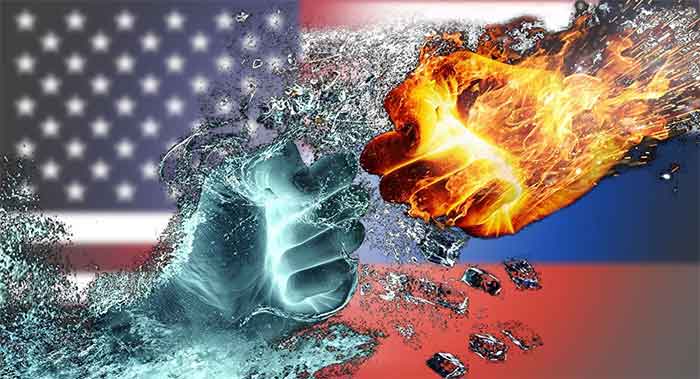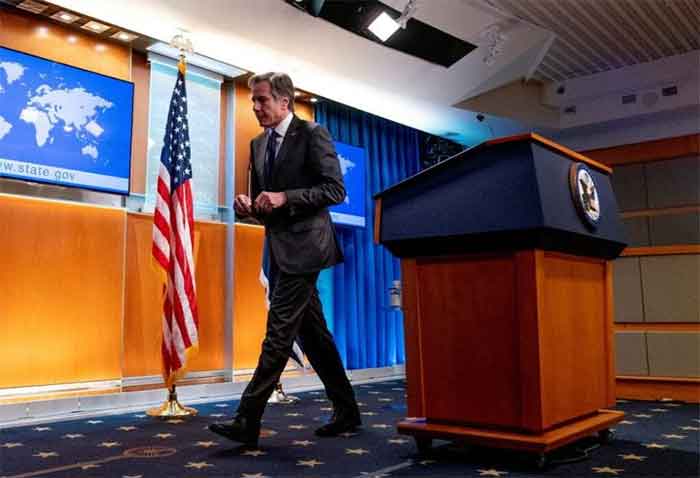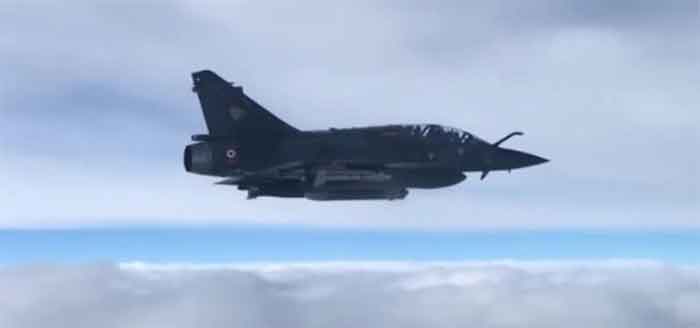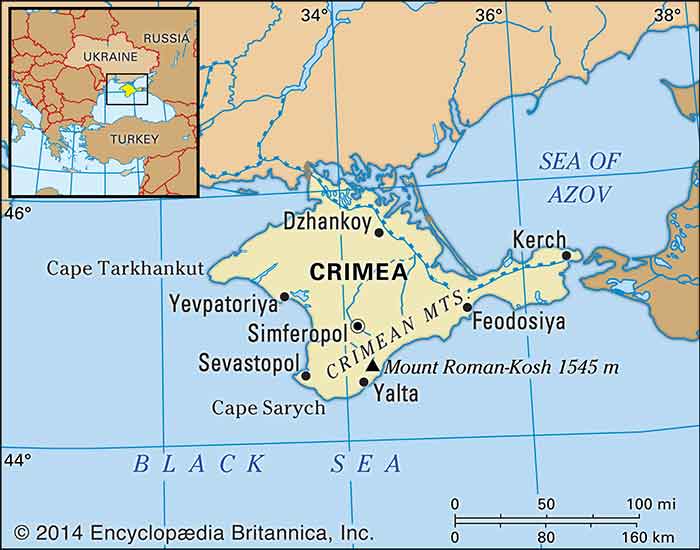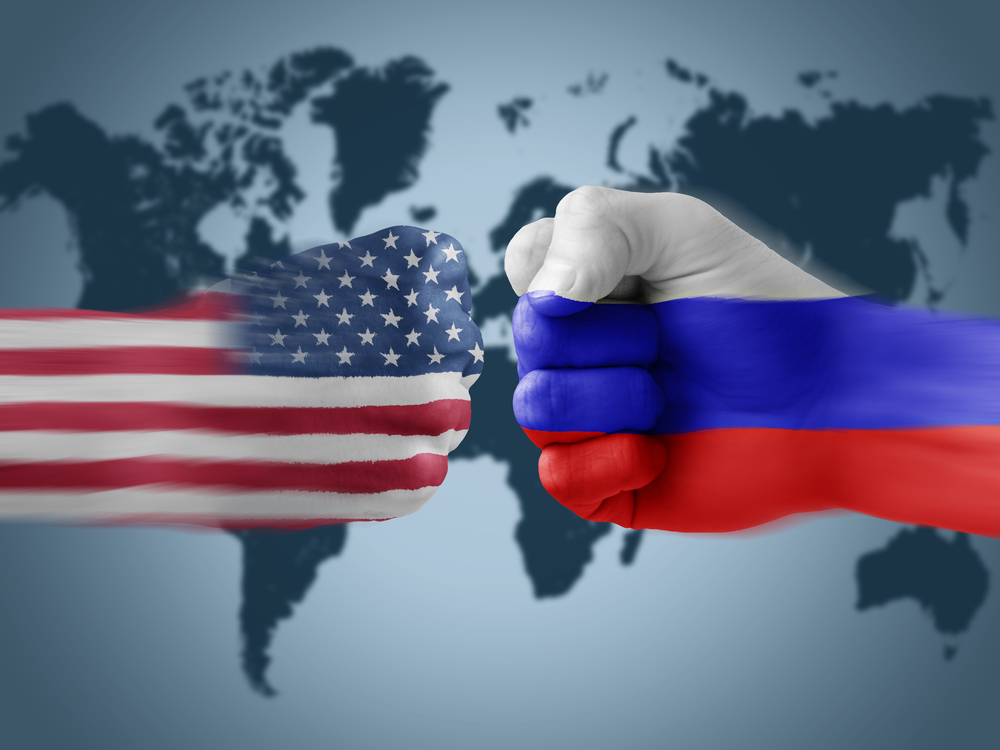
As the American media pumps up its Russophobic rhretoric, escalating the status of the Vladimir Putin and the Russian Federation from “rival” to “adversary” to “enemy, ” and the crisis from “rivalry” to “The equivalent of war,” finally to (unqualified) “war,” numerous urgent questions arise. These questions are, for the most part, ignored by our “mainstream media” (MSM) by which I mean I mean the 90% of all American media that is owned by just six mega-corporations, together with the portion of the remaining 10% following the party line.
Absent a serious discussion of these questions by the MSM, I will pose some of these question and suggest a few answers.
Are we really “at war” with Russia, due to Russia’s alleged election interference?
When Russia tries to interfere with the American elections, our media calls it “the equivalent of war.” When the United States does the same thing to Iran, Chile, Ukraine, Russia, etc. (it’s a long list), we call it “regime change.”
“At war with Russia?” Where are the missile launches, the air combat, the marines on the beaches, the armies in deadly combat, the bombed cities? And where are the casualties – the young men killed in battle? None of the above? Then in what realistic sense are we “at war?”
Even so, we are told that this is “the equivalent of war!” If so, then so too was Iran (1952), Chile (1973), Ukraine (2014), when we overthrew legally elected governments, and in Russia (1996) when we successfully prevented Yeltsin’s defeat. Did we then hear hyperventilating media rhetoric about “the equivalent of war?”
Our media have made it clear to the Russians that we regard them as are our enemies. Why then should we be surprised if they then apply the same “election tampering” tricks on us that we have inflicted upon other nations, including Russia?
If the American public is convinced that “we are at war” (albeit “metaphorically”), might not that public be eager to retaliate with a “real war” – with missiles, tanks, aircraft, bombs and casualties.”
No, we are not “at war” with Russia in any meaningful sense of that word. “War talk” is inflammatory, irresponsible and very dangerous. Let’s stifle it. Are you listening, Morgan Freeman, Rob Reiner, Keith Olbermann, Rachel Maddow, Malcolm Nance, (and many more)? Not likely. And so the beat goes on, as we march confidently toward unspeakable disaster.
Do the Russians and the Americans have different attitudes toward war?
American and Russian attitudes toward war are vastly different, and for very good reasons.
For Americans, war is an adventure, glamorized by Hollywood and video games, and always fought on foreign soil “over there.” In World War II, not one Nazi bomb or artillery shell fell on the American continent.
For the Russians, war is an unmitigated catastrophe. Russia has been invaded countless times in its history, most horribly in World War II (which the Russians call “The Great Patriotic War”). In that war, twenty-five million Soviet citizens perished, including ninety percent of all males born in 1920.
Recently, NATO conducted “war games” in Estonia, within artillery range of St. Petersburg, where, in the 900 day siege of Leningrad (1941-1944), a million Russians starved to death. NATO exercises were also conducted in Poland, across which the Wehrmacht marched on its way toward the slaughter of those twenty-five million Soviets
Perhaps these NATO maneuvers are, as the NATO officials insist, not intended to threaten the Russians. But surely we must understand why the Russians might not agree.
The Russian attitude toward war was eloquently stated by Foreign Ministry spokeswoman, Maria Zakharova:
There’s nothing worse in this world than war, because war renders everything else irrelevant. When there is war there is neither good nor bad, there is only war. So when they make documentaries in the West about Russia mounting offensives and launching missile strikes, there’s one thing they fail to understand. The mere mention of war to a Russian makes our skin crawl. It gives is a sense of the world coming to an end — a sense of panic. Once they realize [this], (if they ever do), they will be able to understand everything about us. We have lived through real war so many times — not the movies or video games, the way they experience war. It is not even the kind of war where they dispatch their troops elsewhere, not knowing what it is like to fight a war at home. If they ever realized that, which I hope they will, they are bound to feel guilty and ashamed of what they are doing right now. (February, 2016)
Are the Russians capable of waging war against the US and its allies?
The Russian military capabilities are paradoxical. Offensively, the Russian military is weak. Defensively, it is very strong. Surely the Russians know this. And if they can put propaganda and group-think aside, American strategic planners must also know this.
The Russian military budget is one tenth of that of the United States. Moreover, while the Trump administration is proposing an increase of $80 billion, Putin’s government has announced a 25% reduction. Few Americans know this, because the MSM has not seen fit to report it. The Russian navy has one obsolete, oil burning aircraft carrier, the United States has twelve nuclear powered super carriers, the latest, the USS Gerald R Ford, costing $13 billion. Russia has one military base outside of Russian and former Soviet territory (in Syria). The United States has nearly 800 foreign military bases in ninety countries. Clearly the Russians are not preparing to launch invasions outside their territory. Furthermore, there is no compelling evidence that they intend to do so.
Defensively, the Russians are on much more secure ground – specifically, the “ground” of the largest nation in the world. The United States military – boasted as “the mightiest military force in history” – has failed to win a war since 1945, and cannot prevail over peasant armies in Viet Nam and Afghanistan. Claims that this military can succeed on Russian soil, where Napoleon and Hitler failed, is pure fantasy.
What about Ukraine and Crimea?
I truly wish that Putin had not annexed Crimea, and perhaps by now Putin agrees, given the damage to the Russian economy from the resulting sanctions. But I also doubt that he would have taken Crimea if we had not invested five billion in the effort to get Ukraine into NATO, and if we had not assisted in the ouster of Russia-friendly President Viktor Yanukovitch. That coup was followed by the revolt of the ethnic Russians in eastern Ukraine. Granted, Yanukovich was a corrupt scoundrel. But he was also legally elected to his office.
Crimea is a bell that can not easily be unrung. Apparently up to ninety percent of Crimeans prefer to be Russians than Ukrainians. Should they not have a say regarding their future? My suggestion: another plebiscite, this time supervised by the United Nations. If, as is likely, the Crimeans vote for independence from Ukraine, the Russian government should pay reparations to Ukraine, which would cost Russia far less than the cost of the western sanctions following the Maidan uprising (2014). In order to allow a “cooling-off period,” following the plebiscite Crimea might agree to be an independent republic for twenty to thirty years, following which, most likely, the Crimean people would choose union with Russia.
Russia has not “invaded” eastern Ukraine, although to be sure, many Russians have crossed to border to fight with the ethnic Russian rebels. They have done so to protect their Russian-speaking cousins from Kievan “irregulars” some of whom wear swastikas on their helmets and uniforms. Yes, there is fault to be found on both sides, but there are no regular organized Russian army troops in eastern Ukraine, and no tanks, personnel carriers, artillery or Russian air strikes in Ukraine. The eastern regions of Donetsk and Donbas have not been annexed by Russia. Solution? A federated Ukraine, with the eastern, Russian-speaking regions semi-autonomous from the Kiev government.
American critics of Russian “interference” are typically ignorant of the historically close ties between Ukraine and Russia. Kiev is the “cradle” of the Russian nation where, a thousand years ago, Prince Vladimir converted to Christianity and “urged” (under duress) the entire city to do likewise.
Is the new “Committee to Investigate Russia” likely to shed light on the so-called “war” against Russia?
Why should this “Committee” even bother to “investigate,” since they clearly have answered the question to their satisfaction. “We are at war!” Morgan Freeman proclaims. And CIR founder, Rob Reiner: we will endeavor to “understand the gravity of Russia’s invasion of our democracy.” “Invasion”? “Our democracy”? Shouldn’t these tacit assumptions be subjected to critical analysis? Apparently Rob Reiner and the CIR do not think so.
“Verdict first, trial later, said the Red Queen.”
There are numerous informed experts on Russia – former diplomats (e.g., Jack Matlock), scholars (e.g. Stephen F. Cohen), historians (e.g. John Mearsheimer), journalists (e.g. Robert Parry) among them, all loyal American patriots – who have strikingly contrary opinions about Russia and the current conflict. If the CIS agrees to examine these opinions respectfully and objectively, then I will take their pronouncements more seriously.
Likewise the commercial news media. Unfortunately, these moderates (aka “Russian dupes”) are totally absent from the mainstream media. If they are allowed on panels with “the usual suspects,” and treated with respect and not as targets; if, that is to say, they are allowed to complete their sentences, and even string a few sentences together uninterrupted, then I might begin to pay more attention to the MSM.
I find little reason to expect such responsible behavior on the part of the Committee to Investigate Russia, or the mainstream commercial media.
Some of the pro Trump ads on Facebook were paid for in rubles. Doesn’t that prove that the Russians were involved?
Pause for a moment and take a critical look at this charge. The Russians allegedly mounted a covert campaign to influence the election by purchasing pro-Trump ads on Facebook, some of which were paid for in rubles. “Covert”? “Rubles”?
Say what you will about the Russians. But surely we can agree that they are not stupid. If they truly wanted to keep the source of these ads secret, would they pay for them in rubles? However, if someone wanted to steer suspicion toward the Russians, then they would connive to pay for those ads in rubles. In short, this has all the earmarks of a “false flag” operation. And the Russophobes have fallen for it totally. For example in an MSNBC interview on September 25, Hillary Clinton cited those Rubles as “evidence” of Russian “interference.” It is a charge heard repeatedly in the MSM, in the apparently successful belief that the public will not see the absurdity of it.
And now, the media is obsessed with Russian infiltration of “social media” – Twitter, Facebook, etc. The Russian investment in this mischief has been estimated at $100,000, elsewhere at $250,000. These princely sums, we are told, may have significantly affected the election. Oh, really? That “investment” of $250,000 amounts to .0005 percent of the five billion cost of the election.
Just what is this “Russian threat?”
There are several alleged “threats.” Among them:
- Russia aims to undermine our “leadership of the free world,” and in particular, the NATO alliance.Well, what should we expect? We have expanded a military alliance (NATO), in violation of an agreement with Gorbachev not to do so, in exchange with Russia allowing the reunification of Germany as a NATO member. Do we now expect Russia not to respond to NATO troops along its western border by not attempting to weaken that alliance? As for our “leadership of the free world,” our buffoonish President has done far more to undermine that leadership than Putin could have imagined that Russia could accomplish.
- Russia resists the American “global hegemony” proclaimed by the neo-cons. When we believed that “the international communist conspiracy” intended to establish a “global hegemony,” the West responded vigorously with NATO and with expanding military budgets. When our neo-cons openly advocate American global “hegemomy,”and when our Congress and our media boldly announce American “exceptionalism” to international norms and to the United Nations Charter in particular, why should we be surprised if the Russian resist?
- Russia aspires (“threatens”?) to become a strong, prosperous, and independent nation among the “community of nations. Of course it does! What nation does not? What nation does not have a “right” to such aspirations. Apparently Russia is succeeding in this aim, despite American sanctions (as I elaborate below).
- Russia threatens nuclear attack.And the United States does not? In fact, in 2014 President Obama announced an expansion of our nuclear deterrent that will cost a trillion dollars over the next thirty years. And so Russia responds by announcing a modernization of its nuclear forces. Who’da thunk it?
So we are back to the old Cold War, zero-sum, nuclear arms race. When will we ever learn that the threat of nuclear war cannot be rationally regarded as an “us vs. them” contest. It is, instead, a common problem, requiring a plus-sum solution. Now and then, both sides come to that realization: the resolution of the Cuban Missile Crisis, nuclear test bans, non-proliferation treaties, and the Reagan/Gorbachev accords. But then, somehow, we slip back into our bad habits. I am reminded of the closing comment by the computer in the first “War Games” movie: “a strange game. The only winning move is not to play .”
- Russia is undermining our democracy by meddling with our elections.This accusation dominates the anti-Russia, anti-Putin media barrage. Although the accusation escalates day by day – “We are at War!!” we are told – many responsible observers reply that the charge is either unproven or enormously exaggerated. See, in particular, Robert Parry here and here. But don’t expect to encounter dissenters such as Parry anywhere in the mainstream “Ministry of Truth.”
Count me among these dissenters. I need not burden the reader here with criticism of the “Russian meddling” hysteria, since I have done so elsewhere at some length here and here.
If, as I suspect, all five of these alleged “threats,” are either groundless or vastly exaggerated, will someone please explain to me why or how “Putin is threatening our democracy?”
I have much more to say about “the Russian threat” in my essay, “Unwrapping the Russia Enigma.”
What is the point, and the likely result, of economic sanctions against Russia?
What do we expect? An urgent plea from the Kremlin, “”We give up, you win! Please send over your Viceroy to come and rule us.”
History affirms that Russians do not respond like this. Instead, they respond with defiance and resolve. If challenged, they will look elsewhere for an alliance against the American’s self- proclaimed “global hegemony” And where? China of course. Or the BRIC economic union (Brazil, Russia, India, China). And you might be astonished to find defections from some of our European and Pacific Rim “allies,” even now getting restless in the face of American bluster, arrogance, and bullying. After all, as few media pundits have bothered to note, economic sanctions cut two ways. Forbid sales of agricultural products to Russia, and European farmers will suffer. Same for consumer goods and much more.
Even so, won’t these sanctions devastate the Russian economy?
Don’t count on it. If the West refuses to deal with Russia, then Russia will turn to the East. The Russian prospects for such a “turn” are remarkable to say the least. They might totally transform the global economic system, with the United States left behind. In fact, such a transformation is already in progress. Consider:
The United States is separated from its European and Pacific Rim allies by broad oceans. In contrast, Russia and China share a 2316 mile border. Today, a slow train can travel from eastern China to Madrid in three weeks. When a projected hyper speed train is installed, that time will be reduced to two days. Today a train ride from Moscow to Beijing takes six and a half days. With high speed rail, that time will be reduced to 33 hours.
That rail system is projected to extend from Beijing to Portugal, with branches to the south to Islamic nations, and transecting the territories of our “steadfast European allies,” who will surely utilize it to establish firm commercial ties to Russia and China and other nations to the East.
And what investments and technological wizardry do we American have to match all that? Have you taken a ride on Amtrak recently? We could surely have a high speed rail network in the United States to rival anything in China, Japan or Europe. However, our Congress has decreed that tax breaks and tax shelters for our billionaires are more urgent.
“But surely, the Russian economy, broken by US and Western sanctions, cannot finance such expensive projects?” Really? Have you seen “Moscow City,” a massive new business center two and a half miles from the Kremlin? Take a look. Visit Moscow today and you will see cranes everywhere, as dozens of new high-rise building are being constructed. Is this evidence of an economy in ruins?
The United States will not establish its cherished “Global Hegemony” simply because it cannot. It lacks the political institutions, the economic foundations, the infrastructure, and the human resources, to do so. A bold claim, that I will argue in my next essay.
If we go to war with Russia, will it be like World War II? Will it “go nuclear?”
“World War III” would be nothing like its predecessors. Armies that prepare to fight the “next war” with the weapons and tactics of the previous, tend to lose. Strange to say, the Japanese did us a favor by sinking our WWI battleships at Pearl Harbor. We responded, not with a vast fleet of new battleships, but with numerous aircraft carriers – the kind of ships that launched the Pearl Harbor attack.
Clearly the Russians, with their minuscule investment in conventional weapons and their projected reduction of their defense budget, are not preparing to fight a repeat of WWII. The next war would be a cyber war, and it would be brutal.
The 1940s infrastructure was connected with roads, rails, wires, vacuum tubes and radio (“RF”) transmission. Today’s commercial infrastructure is digitally connected with semiconductors and microprocessors, and it is much more vulnerable. For example, a high-altitude nuclear blast, while it might not cause extensive property or personal damage, would create an electro-magnetic pulse (EMT) that would “fry” (i.e. destroy) all microcircuits within a wide radius. And a well-designed computer virus or “worm” could infect and disable essential military and industrial computers. Indeed, the “Stuxnet” virus, did just that in 2010 when it sabotaged the Iranian nuclear industry.
The Russians know this, and they are showing considerable skill in cyber warfare. The US military’s response is more $13 billion aircraft carriers (twelve and counting), super sonic aircraft and drones, each of these advances of WWII weapons and technology.
An all out cyber war would massively attack our communications system, in a shutdown of the internet and emails. Also, the disruption of business and financial communications and utility grids. Imagine returning home to no electric power, phone service or access to the internet. Add to that, no restocking of the local supermarket or gas stations. And no capability of the government to make prompt repairs. The result: Total economic collapse, and widespread starvation and disease. Doubtlessly, if this happens, we would attempt to do the same to Russia. A few autonomous micro systems would survive, most ominously the strategic nuclear attack forces. They would be the only remaining mode of retaliation from the cyber attack.
If both sides recognize these implications of cyber-warfare — nothing less than a cyber version of Mutually Assured Destruction — they might be restrained. But don’t count on it. There is nothing “gradual” about a nuclear first strike: it would surely trigger a retaliation.. Cyber warfare is different — it can escalate from trivial beginnings. In fact, the Russophobes are telling us, even without compelling evidence, that Russia has already launched such a “war” with its “meddling” in the 2016 election. A year ago on “Meet the Press,” Vice Presidet Joe Biden indicated that the United States is fully prepared to embark upon that escalation when he said: “We’re sending a message [to Putin]. We have the capacity to [retaliate] .. It will be at the time of our choosing, and under the circumstances that have the greatest impact.” One must wonder if Biden had any idea of the dreadful import of that warning. Did he somehow believe that Russia would not then retaliate in kind? Where does it end?
Why is the media Russophobic? What are the Putin-demonizers trying to accomplish?
That the MSM is russophobic is beyond dispute. Just watch or read it. You might find Russia-friendly and peace-oriented media “at the fringes,” in the dissenting internet and publications such as The Nation. But you have to look for it, and the audience is minuscule.
Why the MSM is russophobic is more difficult to understand. One question-begging answer is “group think.” If you are a TV news “personality” and have kind words for Vladimir Putin and his government, and if you invite a real-live Russian on your program to defend Russian policy, you will soon be unemployed. Just ask Phil Donahue. If you are a politician and express similar views, you have forfeited your career and will likely lose your next election.
Do I exaggerate? Then please identify just one dissenting russophile in the MSM. (To repeat, by “the mainstream media” I mean the six corporations that control 90% of the US media). As noted earlier, there are numerous scholars, retired diplomats, historians and journalists who sharply dissent from the russophobic MSM “group think.” Their views may be found at the websites of The Center for Citizen Initiatives, The American Committee for East-West Accord, American University in Moscow, Consortium News. But how many of these dissenters have appeared on Face the Nation, Meet the Press, MSNBC panels, and such?
So what are the media russophobes trying to accomplish? In two words: “job security.” To accomplish this without embarrassment, they must persuade themselves to actually believe this propaganda.
We’ve seen this before: early in the Viet Nam war, in the run-up to the Iraq war.
Now to that begged question: why the group-think? First of all, “Russia-gate” is seen by the “never Trumpers” of both parties as a crowbar with which to pry the Moron-in-Chief from his office.
But more fundamentally, the russophobic group-think is nurtured by careerism, the profit motive, and audience size – by senior military officers who want to add more stars to their shoulders, by military contractors who want to glom on to still more of the federal budget, and by media moguls who have discovered that peace is a bore and that war-talk is boffo box office.
This is the “military-industrial complex” about which President Eisenhower warned us in 1961, now metastasized into the “military-industrial-congressional-intelligence-media complex,” aka “the deep state.”
In a 1987 letter to The New York Times, Soviet scholar Georgi Arbatov asked; “We have a secret weapon … we will deprive America of The Enemy. And how [then will] you justify … the military expenditures that bleed America white?”
Perhaps we have an answer: if we don’t have an enemy, then we may have to invent one.
Goals aside, where is this russophobia leading us?
The lesson of history is clear: escalating war-talk, unchallenged, often leads to war.
One might assess the state of “Russia-fever” today with a present-time snap-shot. Far better to assess it as a “moving picture” – a trend-line. If so, we find that Vladimir Putin has evolved from “rival” to “adversary” to “enemy” to “demon.” What’s ahead? “A new Hitler?” “Another Stalin?” “Devil incarnate?” Uncontested propaganda is like a narcotic: the addict needs more and more of it to get the same “kick.
Congressional and media group-think have put us on a one-way road to catastrophe – a road with no recognized exits and no prospect of a reversal of direction. But there are exits: Negotiation and de-escalation, following a mutual acknowledgment of the common nuclear peril. If not these, then what?
That’s a question that you are unlikely to hear from the pundits and politicians.
I hasten to add that I am no admirer of Vladimir Putin If I were a Russian, I would not vote for him, as more than a third of the Russians in the 2012 election did not. But he is the legally elected President of the Russian Federation, and he is supported by a large majority of Russians. So, like him or not, we must deal with him.
What goals, what “trends” are remotely worth the perils of Cold War II?
In a word: none!
Even so, this is another existential question rarely if ever posed in Congress or the mainstream Ministry of Truth.
Is there an escape from this march to oblivion?
There is. Most urgently: negotiation and de-escalation, as noted above.
Beyond that, we might acknowledge, without necessarily agreeing with, the Russians’ perceived grievances against us.
We might attempt, however painfully, to accept the idea that we Americans are not perfect, or even “exceptional.” We might then make a sincere and determined attempt to correct these errors. As a wise man once observed: “the greatest of all faults is to be conscious of none.”
We might, through our news media and our schools, learn more about Russian history and culture, and apply this knowledge to our foreign policy. Russia has bestowed upon the world a vast legacy of literature, art and science. Following the fall of the Soviet Union, cable TV networks such as The Discovery and The History Channel featured an impressive array of programs celebrating this legacy and portraying Russian history. They are absent today.
We might insist that the media welcome dissenting views. That media entertains “both sides” of the evolution and climate change debates. Why not the Russian “threat”?
Then there is “the peace dividend:” if we cut the $824 billion military budget in half, the United States would still have the largest military in the world – not including the military of its allies. Those $400 plus billions could then be applied directly to the physical and human infrastructure – roads, rail, water and sewage, electrical grids, internet access, schools, scientific research and development. The neglect of these essential institutions and services poses a far greater threat to American security and world leadership, than any Russian threat imagined by the media-hawks.
All these positive moves are possible. But sadly, they are unlikely while we are captivated by this deadly anti-Russian “group-think.”
And so I must urgently ask the neo-cons and the mainstream media: What do you see as a way out of this deadly trap? What else other than negotiations and mutual concessions? Do you ever ask these questions? Do you even care?
What common interest could, and should, unite the United States and Russia?
We begin with the mutual acknowledgment that we Americans and the Russians are fated to live on the same planet. There is no “Planet B.” Then we acknowledge common threats and plan together in good faith efforts to deal with them. We know these threats: Non-state terrorism, climate change, nuclear war.
There is no need to posit, as Ronald Reagan suggested, an alien invasion from outer space to unite us.
When I visited Russia seven times in the nineties, Americans were very popular. Some polls showed that Russians approved of Americans four to one. Now, I am told, those numbers have been reversed. No doubt, many Russians are just pissed-off at us yanks. Still more, I suspect, are simply bewildered as they wonder, “why are the Americans treating us this way?”
I confess that I do not have an answer that does us Americans much credit.
Dr. Ernest Partridge is a consultant, writer and lecturer in the field of Environmental Ethics and Public Policy. He has taught Philosophy at the University of California, and in Utah, Colorado and Wisconsin. He publishes the website, “The Online Gadfly” (www.igc.org/gadfly) and co-edits the progressive website, “The Crisis Papers” (www.crisispapers.org). Dr. Partridge can be contacted at: [email protected] .

